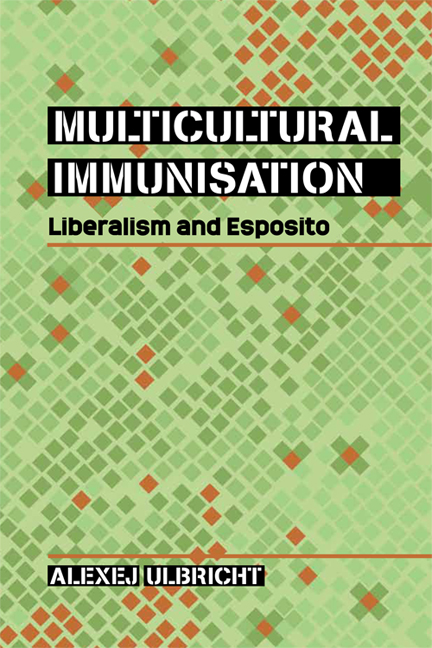Book contents
- Frontmatter
- Contents
- Acknowledgements
- 1 Introduction
- 2 Liberal Thought on Multiculturalism
- 3 Multiculturalism as a Mode of Immunising the Body of Liberalism
- 4 Liberal Multiculturalism and Rights: Citizens, Humans and Other Subjects
- 5 Disagreement and the Horizons of Consensus
- 6 Recognition: Tolerant, and Cunning
- 7 Multiculturalism Beyond Immunity
- 8 Conclusion
- Bibliography
- Index
7 - Multiculturalism Beyond Immunity
Published online by Cambridge University Press: 05 August 2016
- Frontmatter
- Contents
- Acknowledgements
- 1 Introduction
- 2 Liberal Thought on Multiculturalism
- 3 Multiculturalism as a Mode of Immunising the Body of Liberalism
- 4 Liberal Multiculturalism and Rights: Citizens, Humans and Other Subjects
- 5 Disagreement and the Horizons of Consensus
- 6 Recognition: Tolerant, and Cunning
- 7 Multiculturalism Beyond Immunity
- 8 Conclusion
- Bibliography
- Index
Summary
Over the course of the last three chapters, I presented a series of critiques of different liberal theories of multiculturalism. In what follows I want to outline at least the beginnings of a theory about how to move beyond the limitations of liberal multiculturalism. What is needed in order to constitute a multicultural community that is not completely over - determined by its immunitary tendency to strengthen the liberal body politic? It is my contention that escaping the immunitary paradigm here requires moving beyond liberalism. This is not to say that liberalism is completely reactionary or without merit, but to say that, when it comes to cultural plurality, liberalism hits the limits of what its progressive tendency can arrive at. Now, moving outside of liberalism alone does not mean moving outside of immunity; however, I want to argue that it is the first condition for escaping the destructive effects of the immunitary paradigm at work today.
In the first part of the chapter I will be focusing primarily on some of the lessons that we have to draw from the critiques I have outlined in the previous chapters. I will be outlining the kind of things that a new conception of community will need to do in order to break with its immunising tendencies. In the second part, I will be outlining some possible conceptual paths towards its doing so. This outline will necess arily remain somewhat speculative. Rather than offering a detailed programme, it is meant to provide something of a horizon by which to orient this work, and to point up promising paths for thinking and organising cultural coexistence. That this non-liberal conception will not itself become subject to immunitary processes is not guaranteed, but it at least offers the potential for providing a line of flight from the immunitary paradigm in a way that liberalism cannot (and does not really want to). This section on a new conception of community will take up the bulk of the chapter, not because it is the only thing needed for a new politics of multiculturalism, but because it is this aspect which requires the most conceptual work.
- Type
- Chapter
- Information
- Multicultural ImmunisationLiberalism and Esposito, pp. 142 - 166Publisher: Edinburgh University PressPrint publication year: 2014



